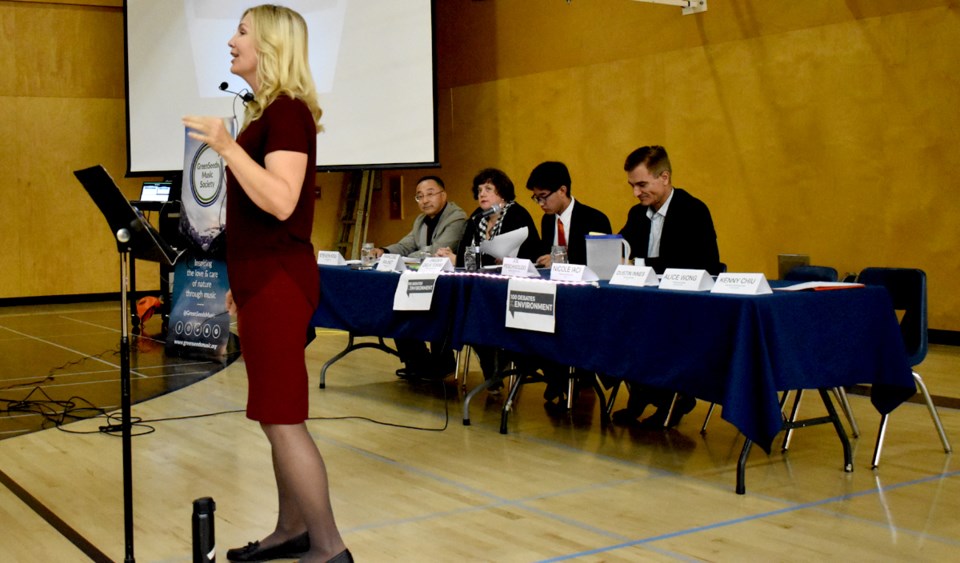There was no disagreement around the table – the earth is heating up and solutions are needed urgently.
Four federal candidates were tripping over each other last week to express the urgency of the climate crisis, but, in the end, the Liberals were more pragmatic in their approach – focusing on the carbon tax and defending the purchase of the Trans Mountain Pipeline - while the Greens and NDP were willing to put more radical solutions on the table.
The Liberals have been heavily criticized in this election for buying the Trans Mountain Pipeline last year for $4.5 billion, but Steven Kou, Richmond Centre candidate, defended this move at the 100 Debates on the Environment at RC Palmer Secondary. (Neither of the Conservative candidates attended the debate and the People’s Party of Canada and independent candidates were not invited.)
Kou said Canada is in a “transition” from fossil fuels, but currently, the country needs “better access to global markets.”
“Every dollar we earn from the Trans Mountain pipeline, we will reinvest in the new clean energy industry,” Kou said.
The Green party is opposed to any new fossil-fuel infrastructure anywhere, said the candidate for Richmond Centre, Francoise Raunet.
“Basically, fossil-fuel industries are a thing of the past,” she said, adding there’s a need to reinvest in new, green technology. “It doesn’t make sense for us to continue to invest in a dying economy.”
Jaeden Dela Torre, running for the NDP in Steveston-Richmond East, spoke against the Trans Mountain pipeline expansion, saying it is a “safety hazard” and that there is no insurance policy in case something went wrong, and said an NDP government would end fossil-fuel subsidies.
Dela Torre, who is 18 years old, said his generation is becoming “desensitized” to climate change issues, but he sees the future as unsustainable, with the “world crumbling” like in a “bad sci-fi film.”
“I’m only in it (politics) because I want to make sure (…) there’s a planet for my generation,” he said.
The Liberal plan is to gradually reduce subsidies for fossil fuel companies, said Kou, but currently, they want to “change behaviour” by putting a price on pollution – the carbon tax which the Conservatives have vowed to scrap if elected.
Economists who study behaviour change say the most effective way to reduce emissions is a carbon tax, Andrew Frank, instructor with KPU’s Environmental Protection Program told the Richmond News, because it incentivizes people to use lower forms of carbon, citing the example of B.C.’s carbon tax.
“It’s the most transparent way to do it - it’s the most effective way to do it,” Frank said.
While the Conservatives are promising to put caps and fees on large emitters, when a tax hits the pocketbooks of the consumer, they are more likely to change their behaviour, Frank said.
Kou’s Steveston-Richmond East counterpart, Joe Peschisolido, told the audience at RC Palmer that the Liberals have committed to several climate action initiatives, like banning single-use plastics by 2020 and a $2 billion disaster mitigation fund.
But Raunet said science is saying “we don’t have much time to waste.” Her party is advocating changing the entire economic model in Canada to be more sustainable and slow down climate change.
“The next government is the government that needs to get it done,” she said.
Worrisome for Frank is rhetoric minimizing the danger of climate change, for example, some politicians have said that warming temperatures will have a positive economic impact for Canada.
The People’s Party of Canada’s (PPC) platform states that it’s an “undisputed fact” that the climate has always changed and that there is no scientific consensus that carbon dioxide produced by humans is causing global warming.



